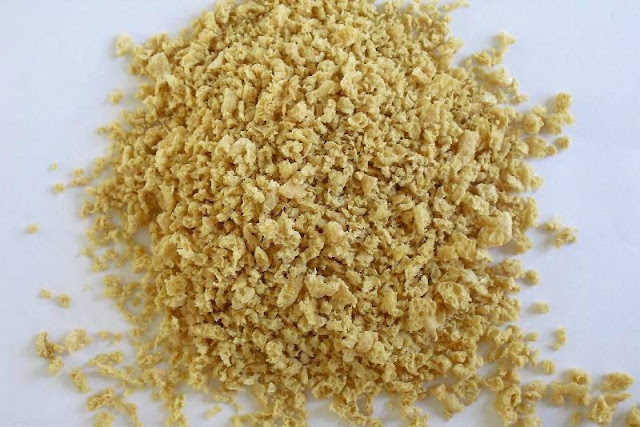Textured Vegetable Protein Is A Versatile And Popular Plant-Based Protein Source
 |
| Textured Vegetable Protein |
Textured
Vegetable Protein (TVP), also known as textured soy
protein, is a versatile and popular plant-based protein source. It is derived
from soybeans and is widely used as a meat substitute in various vegetarian and
vegan dishes. TVP has gained popularity due to its affordability, long shelf
life, and high protein content. TVP is made from defatted soy flour, which is
processed to remove the soybean oil. The remaining protein-rich material is
then heated under pressure, extruded, and dried to form textured soy protein
granules, flakes, or chunks. The resulting product has a fibrous and chewy
texture, resembling ground meat. It is often sold in a dehydrated form and can
be rehydrated before use.
One of the significant
advantages of Textured Vegetable Protein
is its versatility in the kitchen. It can be used as a substitute for ground
meat in various recipes, including chili, burgers, tacos, meatballs, and
casseroles. Its neutral flavor allows it to absorb the flavors of the
seasonings and sauces it is cooked with, making it a suitable ingredient for a
wide range of dishes. In addition to being a versatile ingredient, Textured
Vegetable Protein is also highly nutritious. It is a complete protein, meaning
it contains all essential amino acids required by the body.
According
To Coherent Market Insights The Textured Vegetable Protein Market Was Valued At US$ 831.9 Mn In 2021
And Is Anticipated To Grow At A CAGR Of 4.49% From 2022 To 2030 To Reach US$
1160 Mn.
This makes it an
excellent choice for individuals following vegetarian or vegan diets, as it
provides a plant-based alternative to animal proteins Textured Vegetable Protein is also low in fat and
cholesterol-free, making it a healthier option compared to many animal-based
protein sources.The nutritional profile of TVP varies depending on the brand
and type, but generally, it is rich in protein, dietary fiber, and essential
minerals such as iron, calcium, and magnesium. It is also a good source of
vitamins, particularly vitamin B12, which is often lacking in plant-based diets
and is primarily found in animal products. However, it is important to note
that TVP is not a natural source of vitamin B12; it is often fortified with
this vitamin to enhance its nutritional value
There are several
potential benefits associated with the consumption of Textured Vegetable Protein. Firstly, it can help individuals meet
their protein requirements, especially for those who choose to avoid or reduce
their consumption of animal products. Protein is essential for building and
repairing tissues, supporting muscle growth, and maintaining overall health. Secondly,
TVP is generally low in calories and fat, making it a suitable option for
individuals who are watching their weight or looking to reduce their intake of
saturated fats. It provides a satisfying texture and can be used as a filling
component in meals, contributing to a sense of satiety.
You Can Also Read Press Release: Https://Www.Coherentmarketinsights.Com/Press-Release/Textured-Vegetable-Protein-Market-4448



Comments
Post a Comment